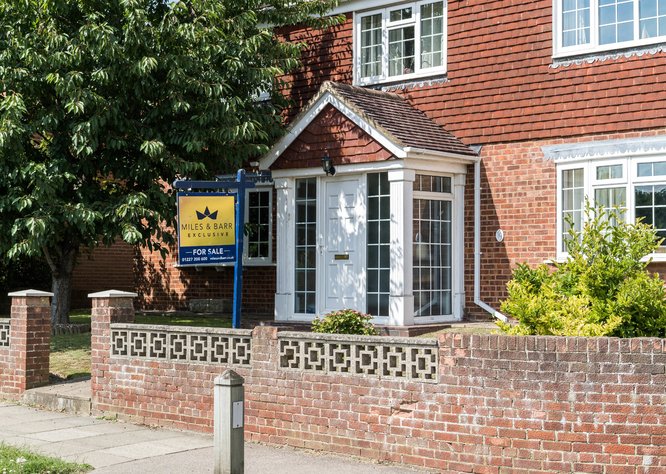
- Home
- Get Social
- Blog
- News
- How to Sell a House with a Mortgage
07 Jul 2023
How to Sell a House with a Mortgage
When selling a house with a mortgage, homeowners typically have two options to consider: mortgage portability or settling their early repayment charges (also known as ERC’s).

This guide will help you make an informed decision when selling your house. We will delve into the benefits and eligibility of mortgage portability, as well as the implications of early repayment charges, empowering you to navigate the process with confidence.
What is Mortgage Portability?
Mortgage portability refers to the ability to transfer the terms and conditions of an existing mortgage to a new property. The purpose is to retain the current mortgage's interest rate, loan term, and other essential terms, ensuring continuity and potentially saving money. This option provides flexibility and convenience for homeowners selling and then purchasing a new property, as it eliminates the need to secure a new mortgage which could incur additional fees.
Three Benefits of Mortgage Portability:
1. Retaining a Favourable Interest Rate: If the existing mortgage has a competitive interest rate, porting it allows homeowners to maintain the same rate on the new property.
2. Cost Savings: Porting a mortgage eliminates the need to pay arrangement fees, valuation fees, and other costs associated with securing a new mortgage.
3. Convenience: Transferring a mortgage from one property to another avoids the hassle of going through the application and approval process for a new mortgage, streamlining the homebuying process.
Is My Mortgage Portable?
Not all mortgages are portable, and the availability of this feature depends on the terms and conditions set by the lender. Typically, portable mortgages are offered by most major banks and lenders. It's important to review the mortgage agreement and consult with your lender or mortgage adviser to determine if the mortgage is portable. It's worth noting that mortgage portability may have limitations, such as a specific time frame within which the porting must occur and potential restrictions on the amount of additional borrowing allowed. Therefore, it's essential to carefully review the terms and conditions provided by your lender.
Click here to read through the eight most commonly asked questions surrounding mortgage portability
To proceed with mortgage portability, you will need to reapply for your current mortgage due to lending regulations. It's important to note that if your circumstances have changed, it is best to consult a mortgage adviser for guidance on how to transfer your existing mortgage to a new property. Click here to arrange a free, no obligation chat with an expert adviser from our recommended partner, Finamply. They’d be happy to guide you through your options.
Borrowing more when porting your mortgage
Exploring the option of porting your mortgage while borrowing additional funds is possible. For detailed information, we advise consulting a financial adviser. If your lender approves the increased borrowing, the top up amount will require a separate mortgage product from their existing offerings. Consequently, an additional arrangement fee will apply, and the interest rate for the extra portion of the loan will align with current market rates. Find out more about borrowing more on our mortgage porting FAQ blog here.
Porting to a cheaper property
Considering a move to a more affordable home and reducing your borrowing? Porting your mortgage can be a smart decision, especially if you have a favourable interest rate. Keep in mind that if your mortgage includes an early repayment charge (typically 1% to 5%), this charge may be applied to the difference between the two loan amounts. Early repayment charges vary based on the remaining term and lender. Consulting a mortgage broker is recommended to assess the specific early repayment charges when porting your mortgage to a less expensive property.
Understanding Early Repayment Charges
If you choose not to port your mortgage when purchasing a new home, you will need to use the money from your house sale to pay off the remaining mortgage. If you are in a fixed-term agreement, there may be associated early repayment charges. We will examine the types of charges set by lenders and how they are calculated. Being aware of your early repayment charges will help you evaluate whether early repayment is a viable option for your house move.
Early repayment charges are fees set by lenders when borrowers pay off their mortgages before the agreed-upon term. For example, if you had a loan of £140,600 over 5 years starting in 2023, your early repayment charges would look something like the following:
| Until 30 June 2024 5.00% of the outstanding loan amount | £7,030.00 |
| Until 30 June 2025 4.00% of the outstanding loan amount | £5,624.00 |
| Until 30 June 2026 3.00% of the outstanding loan amount | £4,218.00 |
| Until 30 June 2027 2.00% of the outstanding loan amount | £2,812.00 |
| Until 30 June 2028 1.00% of the outstanding loan amount | £1,406.00 |
*These figures have been given to us by our friends at Finamply, and only serve as an example
The specific details of early repayment charges can vary between lenders and depending on the type of mortgage you have. Let's look at how they differ for fixed-term mortgages and tracker mortgages.
Fixed Term
With a fixed term mortgage, you agree to a set interest rate for a specific period, typically ranging from two to five years. During this fixed term, early repayment charges may apply if you try to pay off the mortgage, switch to another lender, or make substantial overpayments beyond what is allowed by your lender's terms.
The early repayment charges for fixed term mortgages are usually calculated as a percentage of the outstanding mortgage balance or the amount being repaid early. The percentage charged is typically higher in the earlier years of the fixed term and gradually decreases over time. Always review your lender’s terms and conditions as early repayment charges will differ from lender to lender.
Tracker Mortgage
Tracker mortgages have interest rates that are tied to the Bank of England's base rate. These mortgages often come with more flexibility when it comes to early repayment charges.
For tracker mortgages, early repayment charges are generally calculated as a percentage of the amount being repaid early. The percentage can vary among lenders, but it is typically lower compared to fixed-term mortgages. Some tracker mortgages may even allow borrowers to make overpayments without incurring any charges. Do consult a mortgage adviser and your mortgage terms and conditions for more details.
Seek Professional Advice
Navigating mortgage portability and early repayment charges can be complex. We recommend seeking advice from an experienced financial adviser as they are qualified to guide you through the process. They can help analyse your specific situation, offer personalised guidance, and ensure that you fully understand the implications of your decisions. If you would like to explore your options, click here to arrange for a call with a specialist financial adviser from Finamply.

Instant Property Valuation
What's yours worth? An up-to-date valuation of your property is the first step to finding your dream home!
